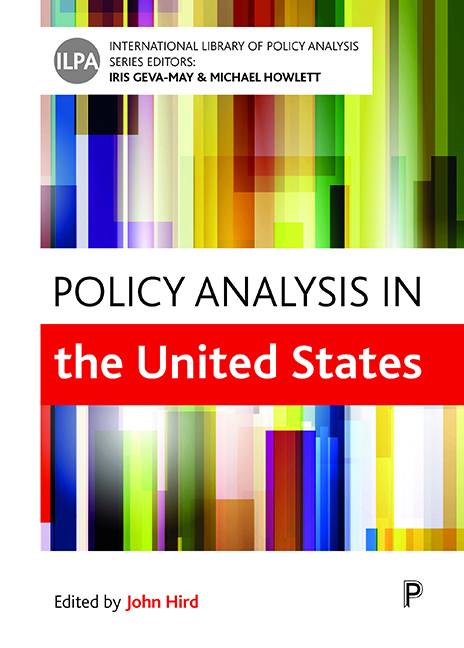Book contents
- Frontmatter
- Contents
- List of tables and figures
- Notes on contributors
- Editors’ introduction to the series
- Introduction
- Part One History, styles, and methods of policy analysis in the United States
- Part Two Policy analysis by governments
- Part Three Policy analysis outside of government
- Part Four Policy analysis education and impact internationally
- Index
Two - The evolution of the policy analysis profession in the United States
Published online by Cambridge University Press: 12 April 2022
- Frontmatter
- Contents
- List of tables and figures
- Notes on contributors
- Editors’ introduction to the series
- Introduction
- Part One History, styles, and methods of policy analysis in the United States
- Part Two Policy analysis by governments
- Part Three Policy analysis outside of government
- Part Four Policy analysis education and impact internationally
- Index
Summary
What does it mean to be a policy analyst? Despite the growth of the field in the United States over the past several decades, this is not a profession that the general public understands. Indeed, as time has gone by since the profession developed, there sometimes appears to be less agreement about the activity than there was in its earliest days. It is obvious that policy analysis has not gained a place in the world of professions equal to that of law, medicine, or engineering. Since many of the original policy analysts worked for the government, it was difficult for those outside of the field to differentiate between public administrators and policy analysts.
There are many reasons for this situation, but at least one of them is the inability of this field to define itself in the context of a changing economic, political, and social environment in the United States and, at the same time, to find a way to describe and appreciate the contributions of the fluid profession. For the answer to the question ‘What is a policy analyst?’ is different today than it was in the 1960s, when the profession first defined itself.
In order to understand these changes, one must view these developments as an example of the intellectual history of the development of a profession that—in its practice—must directly confront the broader changes in American society. Policy analysis, perhaps more than the traditional professions (for example, law, medicine, or engineering) directly confront the changing political values of the day. The America of the 1960s was characterized by a strong belief in progress, abundance, and the possibilities of public sector change. The economic, political, and social fabric of the society supported a reliance on expertise and experts. Soon afterward, however, the climate of opinion within the society had shifted. Americans were less confident about the future, focused on the realities of scarcity, and pulled back from public sector responsibilities. And as many policy issues confront ideological and value differences, there has been an attempt to avoid them through reliance on technocratic solutions.
Yet, at the same time, many in the society are much less willing to defer to so-called experts than they were in the past.
- Type
- Chapter
- Information
- Policy Analysis in the United States , pp. 31 - 54Publisher: Bristol University PressPrint publication year: 2018



